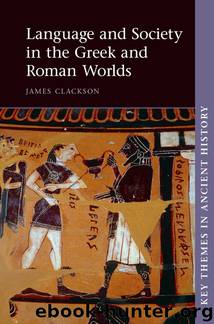Key Themes in Ancient History: Language and Society in the Greek and Roman Worlds by Clackson James

Author:Clackson, James
Language: eng
Format: epub
Publisher: Cambridge University Press
Published: 2015-04-01T16:00:00+00:00
Tracking linguistic variation in the ancient world
The study of ancient language variation is hampered by our lack of access to spoken language. All our evidence for the ancient world is written, whereas modern linguistic research on variation focuses on speech. Getting behind the written record to uncover actual spoken variation is a perennial challenge for researchers into ancient language use. Two of the principal obstacles to research into ancient language variation are our lack of suitable records for individual speakers, and problems with the writing system itself. I shall briefly set out these in this section, before later addressing ways in which researchers have attempted to surmount them.
First, the problem of tracking the language use of individual speakers. It is true that some individuals have left us quantities of text, either surviving directly on papyri, wooden tablets or other media, or maintained through the manuscript tradition, which appear to be amenable to study in variation. Perhaps the best example of a public figure for whom we possess a considerable surviving corpus of work in different genres is Cicero. Furthermore, Cicero both commented on his own habits of linguistic usage, and was the object of the observations of others, some of which survive in later grammarians. Cicero himself acknowledged his own variation in style in different works in a letter to Paetus:
But tell me now, how do you find me as a letter writer? Don’t I deal with you in colloquial style (plebeio sermone)? The fact is that one’s style has to vary. A letter is one thing, a court of law or a public meeting quite another. Even for the courts we don’t have just one style. In pleading civil cases, unimportant ones, we put on no frills, whereas cases involving status or reputation naturally get something more elaborate. As for letters, we weave them out of the language of everyday.
(Cicero Ad fam. 9.21.1; translation D. R. Shackleton Bailey, Loeb Classical Library)
Download
This site does not store any files on its server. We only index and link to content provided by other sites. Please contact the content providers to delete copyright contents if any and email us, we'll remove relevant links or contents immediately.
| Africa | Americas |
| Arctic & Antarctica | Asia |
| Australia & Oceania | Europe |
| Middle East | Russia |
| United States | World |
| Ancient Civilizations | Military |
| Historical Study & Educational Resources |
Underground: A Human History of the Worlds Beneath Our Feet by Will Hunt(12097)
Sapiens by Yuval Noah Harari(5370)
Navigation and Map Reading by K Andrew(5156)
The Sympathizer by Viet Thanh Nguyen(4390)
Barron's AP Biology by Goldberg M.S. Deborah T(4150)
5 Steps to a 5 AP U.S. History, 2010-2011 Edition (5 Steps to a 5 on the Advanced Placement Examinations Series) by Armstrong Stephen(3733)
Three Women by Lisa Taddeo(3433)
Water by Ian Miller(3185)
The Comedians: Drunks, Thieves, Scoundrels, and the History of American Comedy by Nesteroff Kliph(3079)
Drugs Unlimited by Mike Power(2594)
A Short History of Drunkenness by Forsyth Mark(2297)
DarkMarket by Misha Glenny(2212)
And the Band Played On by Randy Shilts(2209)
The House of Government by Slezkine Yuri(2206)
The Library Book by Susan Orlean(2069)
Revived (Cat Patrick) by Cat Patrick(1991)
The Woman Who Smashed Codes by Jason Fagone(1973)
The Absolutely True Diary of a Part-Time Indian by Sherman Alexie(1913)
Birth by Tina Cassidy(1903)
